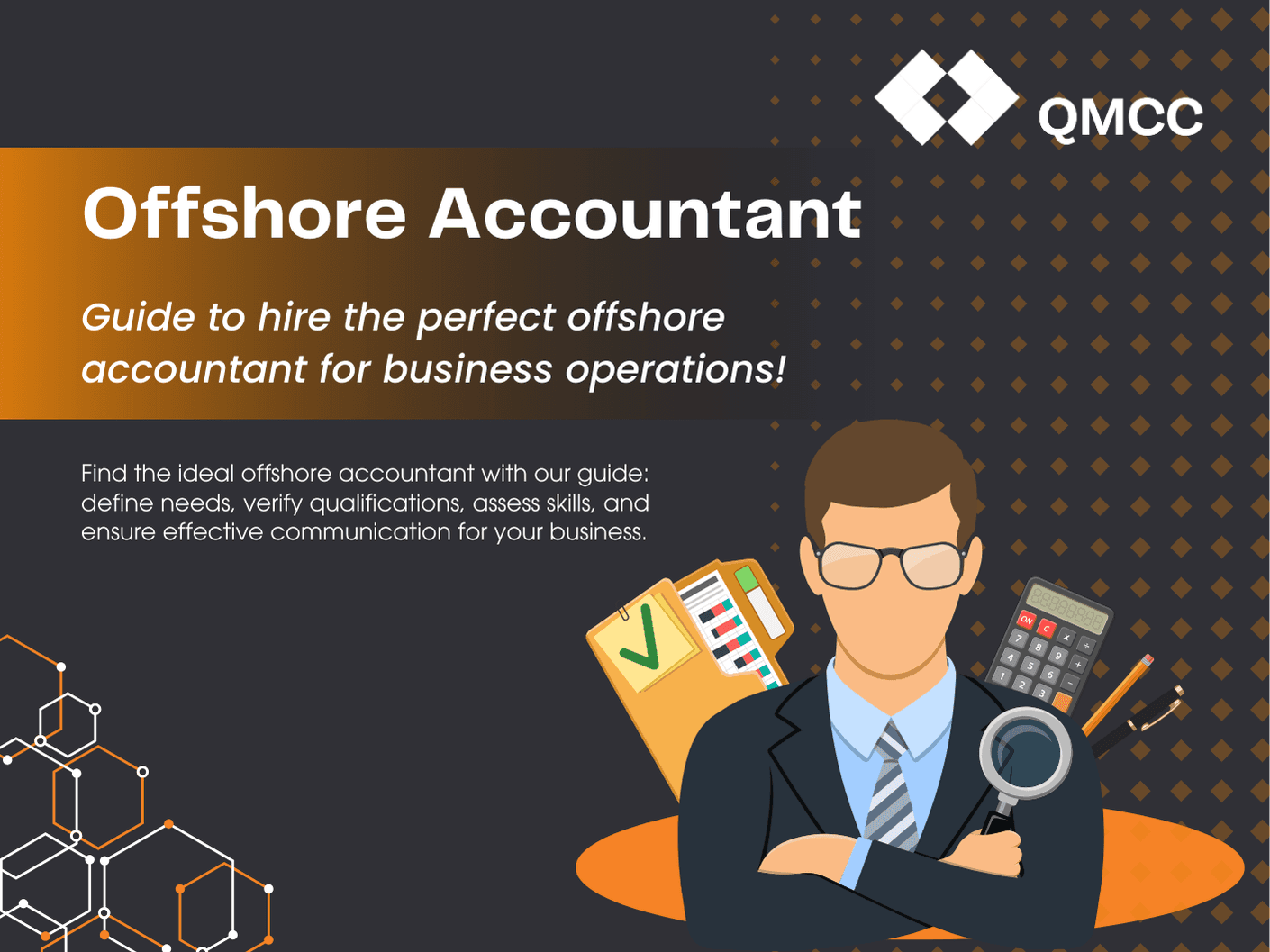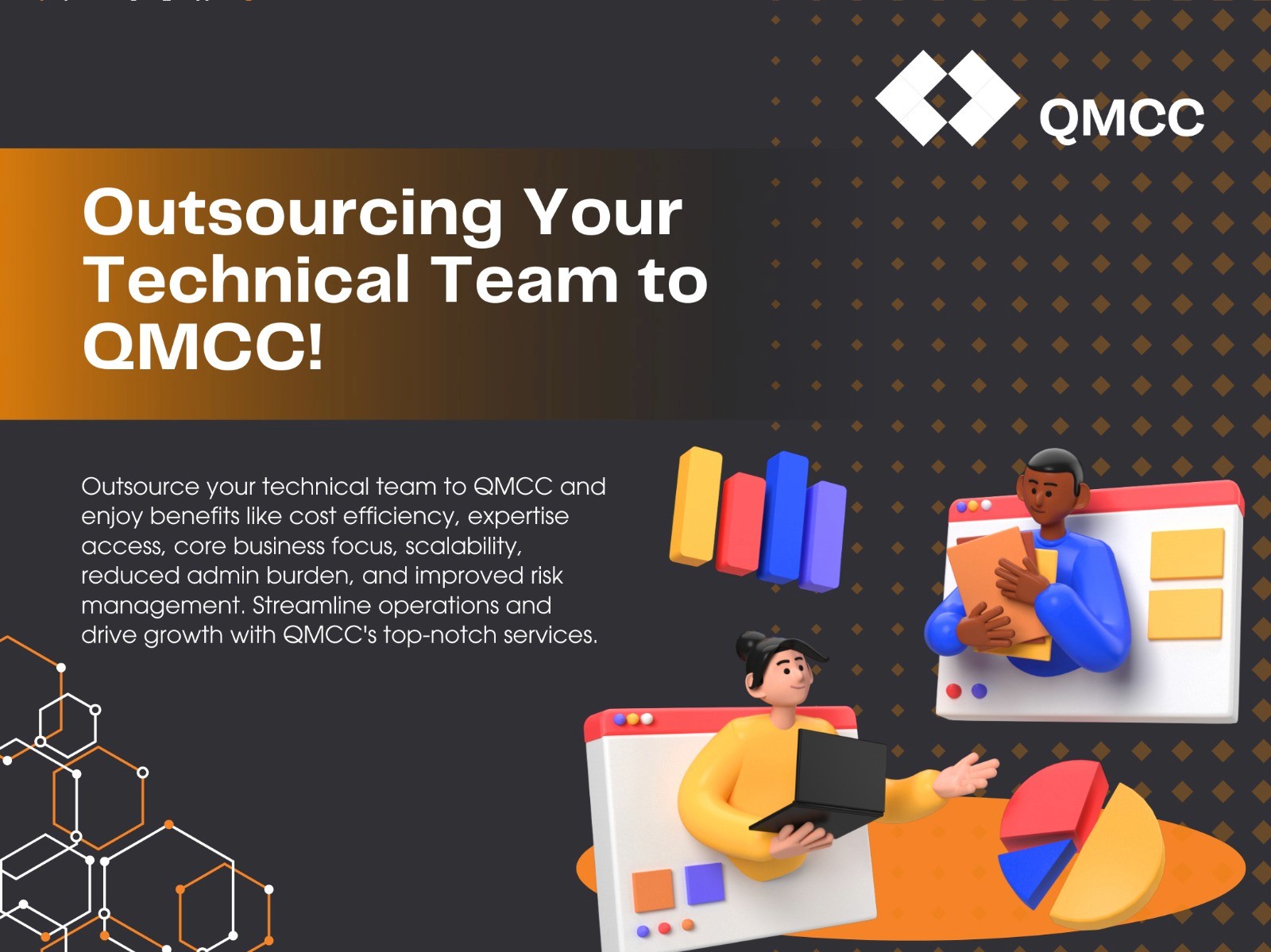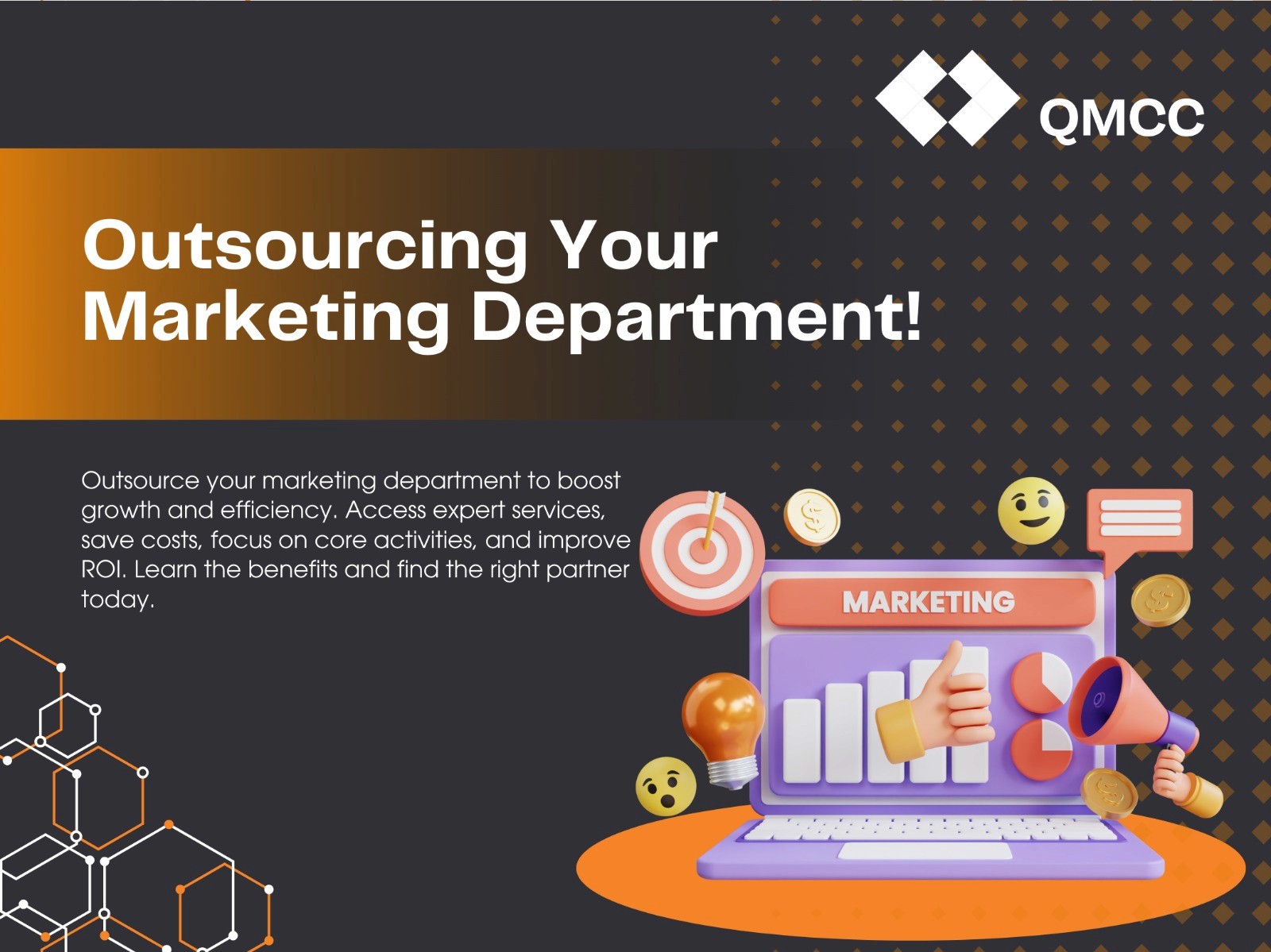
How to Hire the Best Offshore Accountant

How to Hire the Best Offshore Accountant
Introduction In an increasingly globalized economy, businesses are looking beyond their borders to find top talent, including accounting professionals. Hiring an offshore accountant can offer numerous benefits, such as cost savings, access to specialized expertise, and enhanced flexibility. However, finding the right offshore accountant requires careful consideration and due diligence. In this blog, we'll guide you through the process of hiring the best offshore accountant for your business.
Define Your Requirements
Before you start searching for an offshore accountant, it's essential to clearly define your requirements. Determine the specific accounting tasks you need assistance with, such as bookkeeping, payroll, tax preparation, financial analysis, or auditing. Consider the level of expertise required, industry-specific knowledge, and familiarity with relevant accounting software. By outlining your needs, you can create a detailed job description that will attract the right candidates.
Research Potential Candidates
When looking for an offshore accountant, thorough research is crucial. Start by identifying reputable outsourcing firms or freelance platforms that specialize in accounting services. Look for firms or individuals with a proven track record, positive client testimonials, and relevant certifications. Explore online reviews, ratings, and case studies to gauge their performance and reliability. Additionally, seek recommendations from industry peers or professional networks to identify trusted offshore accounting providers.
Assess Qualifications and Experience
Once you have a list of potential candidates, evaluate their qualifications and experience. Look for candidates with relevant educational backgrounds, such as degrees in accounting, finance, or related fields. Check for professional certifications like CPA (Certified Public Accountant), ACCA (Association of Chartered Certified Accountants), or CMA (Certified Management Accountant). Assess their experience working with businesses similar to yours, particularly in terms of industry, size, and complexity. Ask for references and contact previous clients to gain insights into their performance and reliability.
Conduct Interviews and Skills Assessments
Interviews are a crucial step in the hiring process. Schedule video interviews with shortlisted candidates to assess their communication skills, professionalism, and cultural fit. During the interview, ask about their experience with specific accounting tasks, their familiarity with relevant software, and their approach to problem-solving. Consider conducting skills assessments or practical tests to evaluate their technical proficiency and attention to detail. This will help you gauge their ability to handle the accounting tasks specific to your business.
Evaluate Communication and Collaboration
Effective communication and collaboration are vital when working with an offshore accountant. Ensure that the candidate has strong communication skills and is proficient in the language you use for business operations. Discuss their availability and preferred communication channels, such as email, video conferencing, or project management tools. Evaluate their responsiveness and willingness to provide regular updates on the progress of accounting tasks. Clear and transparent communication is essential for maintaining a productive working relationship.
Consider Time Zone Differences
When hiring an offshore accountant, time zone differences can impact collaboration and workflow. Consider how the candidate's time zone aligns with your business hours and whether it allows for timely communication and task completion. Discuss their availability for meetings or urgent tasks that may arise outside regular working hours. Finding a balance between time zone compatibility and the candidate's expertise is crucial for smooth and efficient collaboration.
Review Contract and Pricing Terms
Before finalizing the hiring decision, carefully review the contract and pricing terms. Ensure that the contract clearly outlines the scope of work, deliverables, timelines, and payment terms. Discuss the pricing structure, whether it's based on hourly rates, fixed fees, or project-based pricing. Clarify any additional costs, such as software licenses or transaction fees. It's essential to have a transparent agreement that protects both parties and avoids any misunderstandings.
Implement a Trial Period
To ensure that the chosen offshore accountant is the right fit for your business, consider implementing a trial period. During this period, closely monitor their performance, communication, and adherence to deadlines. Provide feedback and assess their ability to adapt to your business processes and requirements. A trial period allows you to evaluate their suitability before committing to a long-term engagement.
Conclusion
Hiring the best offshore accountant requires a strategic approach and thorough evaluation. By defining your requirements, conducting thorough research, assessing qualifications and experience, and evaluating communication and collaboration skills, you can find a reliable and proficient offshore accountant. Remember to consider time zone differences, review contract terms, and implement a trial period to ensure a successful partnership. With the right offshore accountant, you can streamline your accounting processes, reduce costs, and focus on driving your business forward.
Define Your Requirements
Before you start searching for an offshore accountant, it's essential to clearly define your requirements. Determine the specific accounting tasks you need assistance with, such as bookkeeping, payroll, tax preparation, financial analysis, or auditing. Consider the level of expertise required, industry-specific knowledge, and familiarity with relevant accounting software. By outlining your needs, you can create a detailed job description that will attract the right candidates.
Research Potential Candidates
When looking for an offshore accountant, thorough research is crucial. Start by identifying reputable outsourcing firms or freelance platforms that specialize in accounting services. Look for firms or individuals with a proven track record, positive client testimonials, and relevant certifications. Explore online reviews, ratings, and case studies to gauge their performance and reliability. Additionally, seek recommendations from industry peers or professional networks to identify trusted offshore accounting providers.
Assess Qualifications and Experience
Once you have a list of potential candidates, evaluate their qualifications and experience. Look for candidates with relevant educational backgrounds, such as degrees in accounting, finance, or related fields. Check for professional certifications like CPA (Certified Public Accountant), ACCA (Association of Chartered Certified Accountants), or CMA (Certified Management Accountant). Assess their experience working with businesses similar to yours, particularly in terms of industry, size, and complexity. Ask for references and contact previous clients to gain insights into their performance and reliability.
Conduct Interviews and Skills Assessments
Interviews are a crucial step in the hiring process. Schedule video interviews with shortlisted candidates to assess their communication skills, professionalism, and cultural fit. During the interview, ask about their experience with specific accounting tasks, their familiarity with relevant software, and their approach to problem-solving. Consider conducting skills assessments or practical tests to evaluate their technical proficiency and attention to detail. This will help you gauge their ability to handle the accounting tasks specific to your business.
Evaluate Communication and Collaboration
Effective communication and collaboration are vital when working with an offshore accountant. Ensure that the candidate has strong communication skills and is proficient in the language you use for business operations. Discuss their availability and preferred communication channels, such as email, video conferencing, or project management tools. Evaluate their responsiveness and willingness to provide regular updates on the progress of accounting tasks. Clear and transparent communication is essential for maintaining a productive working relationship.
Consider Time Zone Differences
When hiring an offshore accountant, time zone differences can impact collaboration and workflow. Consider how the candidate's time zone aligns with your business hours and whether it allows for timely communication and task completion. Discuss their availability for meetings or urgent tasks that may arise outside regular working hours. Finding a balance between time zone compatibility and the candidate's expertise is crucial for smooth and efficient collaboration.
Review Contract and Pricing Terms
Before finalizing the hiring decision, carefully review the contract and pricing terms. Ensure that the contract clearly outlines the scope of work, deliverables, timelines, and payment terms. Discuss the pricing structure, whether it's based on hourly rates, fixed fees, or project-based pricing. Clarify any additional costs, such as software licenses or transaction fees. It's essential to have a transparent agreement that protects both parties and avoids any misunderstandings.
Implement a Trial Period
To ensure that the chosen offshore accountant is the right fit for your business, consider implementing a trial period. During this period, closely monitor their performance, communication, and adherence to deadlines. Provide feedback and assess their ability to adapt to your business processes and requirements. A trial period allows you to evaluate their suitability before committing to a long-term engagement.
Conclusion
Hiring the best offshore accountant requires a strategic approach and thorough evaluation. By defining your requirements, conducting thorough research, assessing qualifications and experience, and evaluating communication and collaboration skills, you can find a reliable and proficient offshore accountant. Remember to consider time zone differences, review contract terms, and implement a trial period to ensure a successful partnership. With the right offshore accountant, you can streamline your accounting processes, reduce costs, and focus on driving your business forward.
Introduction In an increasingly globalized economy, businesses are looking beyond their borders to find top talent, including accounting professionals. Hiring an offshore accountant can offer numerous benefits, such as cost savings, access to specialized expertise, and enhanced flexibility. However, finding the right offshore accountant requires careful consideration and due diligence. In this blog, we'll guide you through the process of hiring the best offshore accountant for your business.
Define Your Requirements
Before you start searching for an offshore accountant, it's essential to clearly define your requirements. Determine the specific accounting tasks you need assistance with, such as bookkeeping, payroll, tax preparation, financial analysis, or auditing. Consider the level of expertise required, industry-specific knowledge, and familiarity with relevant accounting software. By outlining your needs, you can create a detailed job description that will attract the right candidates.
Research Potential Candidates
When looking for an offshore accountant, thorough research is crucial. Start by identifying reputable outsourcing firms or freelance platforms that specialize in accounting services. Look for firms or individuals with a proven track record, positive client testimonials, and relevant certifications. Explore online reviews, ratings, and case studies to gauge their performance and reliability. Additionally, seek recommendations from industry peers or professional networks to identify trusted offshore accounting providers.
Assess Qualifications and Experience
Once you have a list of potential candidates, evaluate their qualifications and experience. Look for candidates with relevant educational backgrounds, such as degrees in accounting, finance, or related fields. Check for professional certifications like CPA (Certified Public Accountant), ACCA (Association of Chartered Certified Accountants), or CMA (Certified Management Accountant). Assess their experience working with businesses similar to yours, particularly in terms of industry, size, and complexity. Ask for references and contact previous clients to gain insights into their performance and reliability.
Conduct Interviews and Skills Assessments
Interviews are a crucial step in the hiring process. Schedule video interviews with shortlisted candidates to assess their communication skills, professionalism, and cultural fit. During the interview, ask about their experience with specific accounting tasks, their familiarity with relevant software, and their approach to problem-solving. Consider conducting skills assessments or practical tests to evaluate their technical proficiency and attention to detail. This will help you gauge their ability to handle the accounting tasks specific to your business.
Evaluate Communication and Collaboration
Effective communication and collaboration are vital when working with an offshore accountant. Ensure that the candidate has strong communication skills and is proficient in the language you use for business operations. Discuss their availability and preferred communication channels, such as email, video conferencing, or project management tools. Evaluate their responsiveness and willingness to provide regular updates on the progress of accounting tasks. Clear and transparent communication is essential for maintaining a productive working relationship.
Consider Time Zone Differences
When hiring an offshore accountant, time zone differences can impact collaboration and workflow. Consider how the candidate's time zone aligns with your business hours and whether it allows for timely communication and task completion. Discuss their availability for meetings or urgent tasks that may arise outside regular working hours. Finding a balance between time zone compatibility and the candidate's expertise is crucial for smooth and efficient collaboration.
Review Contract and Pricing Terms
Before finalizing the hiring decision, carefully review the contract and pricing terms. Ensure that the contract clearly outlines the scope of work, deliverables, timelines, and payment terms. Discuss the pricing structure, whether it's based on hourly rates, fixed fees, or project-based pricing. Clarify any additional costs, such as software licenses or transaction fees. It's essential to have a transparent agreement that protects both parties and avoids any misunderstandings.
Implement a Trial Period
To ensure that the chosen offshore accountant is the right fit for your business, consider implementing a trial period. During this period, closely monitor their performance, communication, and adherence to deadlines. Provide feedback and assess their ability to adapt to your business processes and requirements. A trial period allows you to evaluate their suitability before committing to a long-term engagement.
Conclusion
Hiring the best offshore accountant requires a strategic approach and thorough evaluation. By defining your requirements, conducting thorough research, assessing qualifications and experience, and evaluating communication and collaboration skills, you can find a reliable and proficient offshore accountant. Remember to consider time zone differences, review contract terms, and implement a trial period to ensure a successful partnership. With the right offshore accountant, you can streamline your accounting processes, reduce costs, and focus on driving your business forward.
Other Blogs
Other Blogs
Check our other project Blogs with useful insight and information for your businesses
Other Blogs
Other Blogs
Check our other project Blogs with useful insight and information for your businesses
Other Blogs
Other Blogs
Check our other project Blogs with useful insight and information for your businesses


